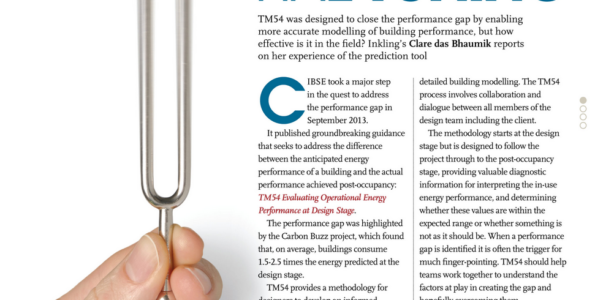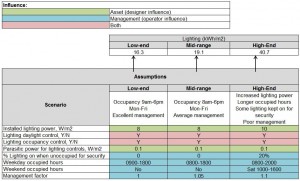Fine Tuning

Claire has written an article for the Oct 2014 CIBSE Journal on our experience of using TM54. http://portfolio.cpl.co.uk/CIBSE/201410/energy-performance-tm54-review/ CIBSE TM54: Evaluating Operational Energy Performance of Buildings at the Design Stage (2013) was designed to close the performance gap by enabling more accurate modelling of building performance, but how effective is it in the field?
Read More- Posted by
 Susie Diamond
Susie Diamond - Posted in CIBSE, Claire Das Bhaumik, Media
 Sep, 29, 2014
Sep, 29, 2014 Comments Off on Fine Tuning
Comments Off on Fine Tuning
What is adaptive thermal comfort?
Overheating in buildings has historically been quantified by the number of occupied hours per year that the indoor temperature exceeds a particular temperature, irrespective of external temperatures. However, recent research has shown that comfortable room temperature changes with the external air temperature meaning that occupants are comfortable with higher room temperatures during warm weather. This […]
Read More- Posted by
 Claire Das Bhaumik
Claire Das Bhaumik - Posted in Research, Training
 Jun, 30, 2014
Jun, 30, 2014 Comments Off on What is adaptive thermal comfort?
Comments Off on What is adaptive thermal comfort?
Claire Das Bhaumik is now a CIBSE Fellow
Claire Das Bhaumik is proud to be a CIBSE Fellow (‘FCIBSE’). Fellowship is the most senior grade of CIBSE membership. The work of an FCIBSE is characterised by the ability to develop appropriate solutions to engineering problems using new or existing technologies, through innovation, creativity and change. Claire is a Chartered Engineer and […]
Read More- Posted by
 Claire Das Bhaumik
Claire Das Bhaumik - Posted in Awards, CIBSE, Claire Das Bhaumik
 Jun, 05, 2014
Jun, 05, 2014 Comments Off on Claire Das Bhaumik is now a CIBSE Fellow
Comments Off on Claire Das Bhaumik is now a CIBSE Fellow
Mind the ‘Performance Gap’ – Inkling offering CIBSE TM54 predicted in-use energy modelling

The “Performance Gap” – the difference between design predictions and operational energy use – is a serious issue for our industry. The CarbonBuzz web site shows that many buildings consume between 1.5 and 2.5 times the predicted design energy. In order to address this, the industry needs both better energy-use predictions and a greater […]
- Posted by
 Claire Das Bhaumik
Claire Das Bhaumik - Posted in CIBSE, Training
 May, 27, 2014
May, 27, 2014 Comments Off on Mind the ‘Performance Gap’ – Inkling offering CIBSE TM54 predicted in-use energy modelling
Comments Off on Mind the ‘Performance Gap’ – Inkling offering CIBSE TM54 predicted in-use energy modelling
Isabel working on Land Art Generator competition entry
Isabel has been working with Sarah Wigglesworth Architects on an entry for the Land Art Generator competition. This is the third year of the competition which invites interdisciplinary teams from around the world to submit their ideas for public art that provides utility-scale clean energy to the grid. This year the competition site is in […]
Read More- Posted by
 Susie Diamond
Susie Diamond - Posted in Competitions, Research
 May, 20, 2014
May, 20, 2014 Comments Off on Isabel working on Land Art Generator competition entry
Comments Off on Isabel working on Land Art Generator competition entry
Susie confirmed as CIBSE awards judge 2015
Susie has been confirmed as a member of the judging panel for the CIBSE Building Performance awards 2015. This will be the 3rd year running that she has been a judge. The launch event for the awards takes place at M&S on the 18th June. More info here: http://www.cibse.org/bpalaunch More information about the awards and how […]
Read More- Posted by
 Susie Diamond
Susie Diamond - Posted in Awards, CIBSE, Susie Diamond
 May, 13, 2014
May, 13, 2014 Comments Off on Susie confirmed as CIBSE awards judge 2015
Comments Off on Susie confirmed as CIBSE awards judge 2015
Inkling to offer more training sessions
Following on from our first (sell-out) training day on predicting in-use energy performance (in association with Colin Lillicrap): http://www.colinlillicrapassociates.co.uk/8.html which took place on 7th May (the next date with places still available is 4th June – follow the link to book); we are now working with Sarah Davis at Skills4Stem to develop further #BuildingPhysics related training sessions […]
Read More- Posted by
 Susie Diamond
Susie Diamond - Posted in Training
 May, 07, 2014
May, 07, 2014 Comments Off on Inkling to offer more training sessions
Comments Off on Inkling to offer more training sessions
Claire to present at CIBSE ASHRAE Technical symposium 2014
Claire is to present research at the CIBSE ASHRAE Technical symposium 2014 in Dublin next month on ‘A comparison of the CIBSE Guide A and TM52 overheating criteria for a range of building types’ The aim of the research was to investigate how the same building performs with different compliance criteria. Three different building […]
Read More- Posted by
 Claire Das Bhaumik
Claire Das Bhaumik - Posted in CIBSE, Claire Das Bhaumik, Events, Research
 Mar, 20, 2014
Mar, 20, 2014 Comments Off on Claire to present at CIBSE ASHRAE Technical symposium 2014
Comments Off on Claire to present at CIBSE ASHRAE Technical symposium 2014
Part L2A 2013 – “How to pass” – Part 2
The Notional Building To assess carbon compliance with the Part L 2013 building regulations, the building as designed is entered into modelling software and compared to a baseline building known as the ‘Notional’ building. The Notional building is defined by the rules in the NCM modelling guide (for buildings other than dwellings). The following […]
Read More- Posted by
 Claire Das Bhaumik
Claire Das Bhaumik - Posted in Research, Training
 Mar, 20, 2014
Mar, 20, 2014 Comments Off on Part L2A 2013 – “How to pass” – Part 2
Comments Off on Part L2A 2013 – “How to pass” – Part 2
Part L2A 2013 – “How to pass” – Part 1
Part L2A 2013 The Building Regulations Approved Document Part L2A 2013 for non-domestic buildings have recently been released. These regulations come into force in England on 6th April 2014. Separate rules apply to Wales, Scotland and Northern Ireland. Transitional arrangements will apply and these are the same as for the 2010 regulations update […]
- Posted by
 Claire Das Bhaumik
Claire Das Bhaumik - Posted in Research, Training
 Mar, 20, 2014
Mar, 20, 2014 Comments Off on Part L2A 2013 – “How to pass” – Part 1
Comments Off on Part L2A 2013 – “How to pass” – Part 1

 Susie: 07972 263 676
Susie: 07972 263 676
 Join Us On In.com
Join Us On In.com
